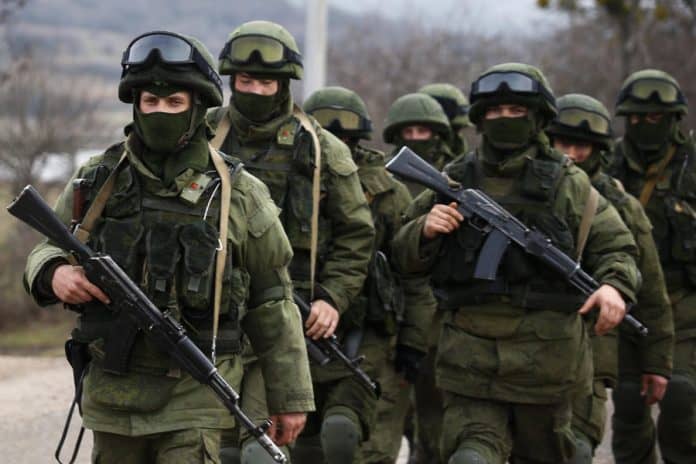Russia’s seizure of control of the Crimea has taken Ukraine to the brink of war and escalated tensions between the US and Russia.
Imperialist tensions in the Ukraine escalated immediately after former Ukrainian president Victor Yanukovych was toppled in late February. This pro-Russian leader was replaced by a pro-Western interim government in a significant blow to Russia’s political influence in the country.
In order to compensate for this Russia quickly mobilised troops to occupy Crimea. This was a relatively low risk strategy due to popular identification with Russia in Crimea, the only majority Russian speaking part of the Ukraine. After the fall of Yanukovych pro-Russian protests began and supposedly local pro-Russian vigilantes, almost certainly Russian soldiers without their uniforms, began to seize control of government buildings and airfields.
After local leaders requested Russian help the Russian parliament approved the use of military force and launched the take-over virtually unopposed. A hastily organised referendum served to tighten and legitimise this grip.
According to official results, the referendum saw 97 per cent of voters in favor of joining Russia. The Crimean Tartar minority, 12 per cent of the population, largely boycotted the referendum on the basis that secession was a foregone conclusion. The Tartars were brutally persecuted under Stalin when the Ukraine was part of the USSR and remain fearful of Russian rule.
Imperialist rivalry
Russia’s determination to control Crimea is part of its push-back against the US and EU encroachment on its old sphere of influence in Eastern Europe. After the collapse of the USSR, the EU and NATO both expanded eastwards, incorporating former Russian-controlled states stretching from Estonia and Latvia on Russia’s border, through Poland and Bulgaria to the south.
Russia therefore fears military encirclement by the West. This fear motivated Russia’s invasion of Georgia in 2008, after it moved to join NATO too. Crimea is also particularly important to it since it is home to Russia’s Black Sea naval base.
Russia’s take-over has drawn the ire of Western leaders. US President Barack Obama condemned the referendum as illegitimate and has initiated travel bans and asset freezes against selected Russian officials. The EU, Canada and Australia have all followed suit.
But beyond Obama’s bluster about showing Russia that “there are consequences for their actions,” the sanctions have had little impact. Most senior officials facing the sanctions have openly mocked them. Dmitry Rogozin, the Russian deputy prime minister, tweeted a picture of a bear with a bottle of vodka and an AK47 with a caption reading “We’re waiting for sanctions”.
An unstable stalemate
Putin’s move raised the serious prospect of war, but his calculation that the Ukrainian military would retreat and that the West would not offer meaningful resistance has so far been right.
Ukrainian military forces in the area were only small and lightly armed, compared to Russia’s presence at the strategic Sevastopol naval base. Successive Ukrainian military installations have fallen to Russian forces without a fight.
Putin has also gambled on the weakness of the West. Following disasters in Iraq and Afghanistan the US military has shown their reluctance to intervene in conflicts like Syria. Their key focus is now on diverting resources to confront China in the Pacific. The EU also depends massively on Russian gas, is already economically fragile and will be looking to avoid any destabilising military conflict.
The tokenistic economic sanctions currently in place also reflect this. Tougher economic sanctions by the EU would threaten damaging Russian retaliation and the weak economic relationship between the US and Russia means US sanctions will likely have little effect.
There are signs the situation has reached a stalemate with Russia proposing talks to resolve the crisis even as sanctions were imposed.
However, if Russia seeks to extend its intervention beyond the Crimea into Eastern Ukraine this could still lead to a full scale disaster. Such a scenario remains a possibility due to ongoing pro-Russian protests in Eastern Ukraine that could be used as a pretext for invasion.
The choice between either the West and the IMF or Russia, and local oligarchs aligned one way or the other, will deliver nothing for Ukrainians. Neither Washington nor Moscow are the answer here.
Ukraine remains one of the poorest countries in Europe with a nominal income per person of only $3969 a year, less than Jamaica or Tunisia. Without a fight for genuine social demands this situation will persist regardless of which flags the oligarchs are waving.
By Adam Adelpour






